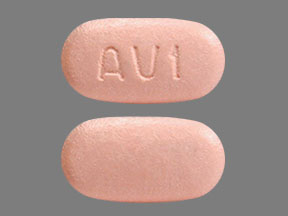Ombitasvir / Paritaprevir / Ritonavir Dosage
Applies to the following strengths: 12.5 mg-75 mg-50 mg
Usual Adult Dose for:
Additional dosage information:
Usual Adult Dose for Chronic Hepatitis C
2 tablets orally once a day (in the morning)
Recommended Regimen and Duration of Therapy:
- Genotype 4, without cirrhosis or with compensated cirrhosis (Child-Pugh A): Ombitasvir/paritaprevir/ritonavir plus ribavirin for 12 weeks
- Therapy-naive patients without cirrhosis who cannot take or tolerate ribavirin: May consider ombitasvir/paritaprevir/ritonavir for 12 weeks
Comments:
- Each fixed-dose combination tablet contains ombitasvir 12.5 mg, paritaprevir 75 mg, and ritonavir 50 mg.
- The manufacturer product information should be consulted for ribavirin dosing recommendations; the manufacturer product information for ribavirin should be consulted regarding dose adjustments.
Use: In combination with ribavirin, for the treatment of patients with genotype 4 chronic HCV infection without cirrhosis or with compensated cirrhosis
Renal Dose Adjustments
Mild, moderate, or severe renal dysfunction: No adjustment recommended.
Comments:
- If required, the manufacturer product information for ribavirin should be consulted regarding use in patients with renal dysfunction.
Liver Dose Adjustments
Mild liver dysfunction (Child-Pugh A): No adjustment recommended.
Moderate to severe liver dysfunction (Child-Pugh B and C): Contraindicated
Precautions
US BOXED WARNING:
- RISK OF HBV REACTIVATION IN PATIENTS COINFECTED WITH HCV AND HBV: All patients should be tested for evidence of current/prior HBV infection before starting this drug. HBV reactivation has been reported during or after completion of HCV direct-acting antiviral therapy in HCV/HBV-coinfected patients who were not receiving HBV antiviral therapy; some cases resulted in fulminant hepatitis, hepatic failure, and death. HCV/HBV-coinfected patients should be monitored for hepatitis flare or HBV reactivation during HCV therapy and posttherapy follow-up; appropriate patient management for HBV infection should be started as clinically indicated.
CONTRAINDICATIONS:
- If used with ribavirin: Contraindications to ribavirin
- Moderate to severe liver dysfunction (Child-Pugh B and C)
- Coadministration with drugs highly dependent on CYP450 3A for clearance and for which elevated plasma levels are associated with serious and/or life-threatening events, including alfuzosin, ranolazine, dronedarone, colchicine (in patients with renal and/or liver dysfunction), lurasidone, pimozide, ergotamine, dihydroergotamine, methylergonovine, ethinyl estradiol-containing products (e.g., combined oral contraceptives), cisapride, atorvastatin, lovastatin, simvastatin, everolimus, sirolimus, tacrolimus, lomitapide, efavirenz, oral midazolam, triazolam, sildenafil (for treatment of pulmonary arterial hypertension)
- Coadministration with drugs that are moderate or strong inducers of CYP450 3A and may lead to reduced efficacy of this drug, including carbamazepine, phenytoin, phenobarbital, apalutamide, rifampin, St. John's wort
- Known hypersensitivity to ritonavir (e.g., toxic epidermal necrolysis, Stevens-Johnson syndrome)
Safety and efficacy have not been established in patients younger than 18 years.
Consult WARNINGS section for additional precautions.
Dialysis
Data not available
Other Comments
Administration advice:
- Before starting this drug, test all patients for evidence of current/prior HBV infection; measure hepatitis B surface antigen (HBsAg) and hepatitis B core antibody (anti-HBc).
- Before starting this drug, assess hepatic laboratory and clinical evidence of hepatic decompensation.
- Administer with a meal, without regard to fat or calorie content.
Storage requirements:
- Store at or below 30C (86F).
General:
- Before starting ribavirin, patients should be assessed for underlying cardiac disease and the manufacturer product information for ribavirin should be consulted for additional information.
Monitoring:
- Hepatic: For clinical signs/symptoms of hepatic decompensation in patients with compensated cirrhosis; hepatic laboratory tests, including direct bilirubin levels, in patients with compensated cirrhosis (at baseline, during first 4 weeks of therapy, and as clinically indicated); hepatic laboratory tests (during first 4 weeks of therapy, then as clinically indicated thereafter); ALT (if increases above baseline levels)
Patient advice:
- Read the US FDA-approved patient information (Medication Guide) for this drug and review the Medication Guide for ribavirin, if applicable.
- Watch for signs of liver inflammation/failure (e.g., early signs: fatigue, weakness, lack of appetite, nausea and vomiting; later signs: jaundice, onset of confusion, abdominal swelling, discolored feces); consult healthcare provider immediately if these symptoms develop.
- Take extreme care to avoid pregnancy during use of this drug with ribavirin and within 6 months of stopping ribavirin in female patients and female partners of male patients; inform healthcare provider immediately in the event of pregnancy.
- Avoid missing doses and complete the entire course of therapy; do not remove tablets from daily dose pack until you are ready to take them.
Frequently asked questions
- What are the new drugs for the treatment of hepatitis C?
- What are the ingredient drugs in Technivie?
More about ombitasvir / paritaprevir / ritonavir
- Check interactions
- Compare alternatives
- Side effects
- During pregnancy
- Drug class: antiviral combinations
Patient resources
Other brands
Professional resources
Other brands
Related treatment guides
See also:
Further information
Always consult your healthcare provider to ensure the information displayed on this page applies to your personal circumstances.


